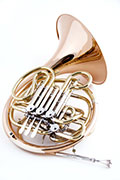- Recognizing the Signs of Hypothyroidism
- 10 Strategies to Overcome Insomnia
- Could Artificial Sweeteners Be Aging the Brain Faster?
- Techniques for Soothing Your Nervous System
- Does the Water in Your House Smell Funny? Here’s Why
- Can a Daily Dose of Apple Cider Vinegar Actually Aid Weight Loss?
- 6 Health Beverages That Can Actually Spike Your Blood Sugar
- Treatment Options for Social Anxiety Disorder
- Understanding the Connection Between Anxiety and Depression
- How Daily Prunes Can Influence Cholesterol and Inflammation
Hear This, Musicians: French Horn May Hurt Your Ears


SUNDAY, Sept. 29Budding musicians, listen up: Out of all the instruments in the orchestra pit, the brass French horn is the one most likely to hurt your ears, according to new research.
Say what? Professional French horn players are at risk for noise-induced hearing loss and should take steps to protect their ears, according to the study by at least one researcher with a personal stake in preserving musicians’ hearing.
Australian researchers assessed the hearing of 144 professional French horn players and found that 11 percent to 22 percent of them showed some form of noise-induced hearing loss, according to the findings recently published online in the Journal of Occupational and Environmental Hygiene.
“Looking at those aged 40 years or younger and also correcting for age, the number of horn players with an apparent hearing loss rose to between 17 percent and 33 percent,” study author Ian O’Brien, a doctoral degree candidate at the University of Sydney and a professional French horn player, said in a journal news release.
The results provide further evidence that French horn players are among the professional orchestra musicians most at risk for developing noise-induced hearing loss, according to the release.
French horn players described their hearing protection practices to researchers as part of the study.
“We were surprised to find that only 18 percent of participants reported using any form of hearing protection,” lead investigator Wayne Wilson, a senior lecturer in audiology at the University of Queensland, said in the news release.
“Even within that 18 percent, the use of hearing protection appears to be inadequate with 81 percent of these participants reporting their frequency of use as ‘sometimes’ and 50 percent reporting they use generic, foam or other inferior forms of protection,” Wilson noted.
The findings “reinforce the need to educate horn players, their mentors and audiologists about the need to protect hearing and how best to achieve this while still enabling musicians to play to the highest level,” professional musician O’Brien said.
While the study found evidence of hearing loss in some professional horn players, it did not establish a cause-and-effect relationship.
“Even mild hearing loss can result in difficulties discriminating pitch, abnormal loudness growth and tinnitus, all of which can affect a musician’s ability to perform, subsequently jeopardizing his or her livelihood,” O’Brien explained.
More information
The U.S. National Institute on Deafness and Other Communication Disorders has more about noise-induced hearing loss.
Source: HealthDay
Copyright © 2026 HealthDay. All rights reserved.










